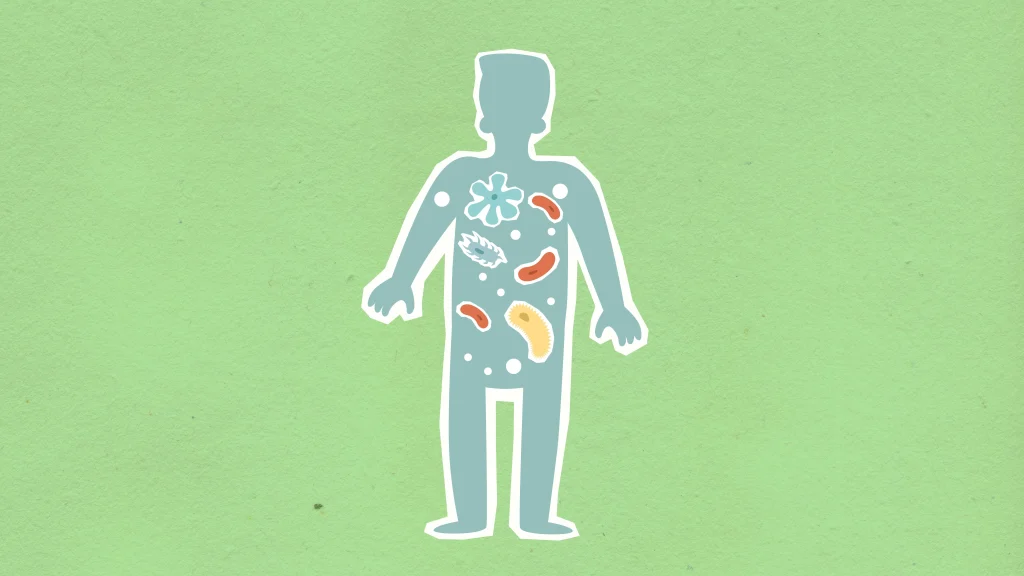You may not think much about your digestive system when your heart is pounding after a workout or when you’re watching your cholesterol levels. But research shows that your gut and your heart are connected in more ways than one. And recently, the relationship between gut health and heart health has become a major focus in health research.
If you’re wondering how to eat a clean diet or what counts as healthy food and unhealthy food, you’re not alone. It can feel overwhelming, but you don’t have to do it alone. More people now work with virtual nutritionists that take insurance, making it easier to get personalized support for gut and heart health.
In this article, we’ll break down the gut-heart connection, share simple food and lifestyle tips, and guide you on where to get expert help.
What Your Gut Might Be Trying to Tell You About Your Heart
Your gut is home to trillions of bacteria, viruses, and fungi that work together as your gut microbiome. These microbes help digest food, absorb nutrients, and produce essential vitamins like B and K that your body can’t make on its own. But their influence goes far beyond digestion.
A balanced microbiome supports your immune system and maintains the integrity of the intestinal lining. This barrier prevents harmful substances like toxins and undigested food particles from leaking into your bloodstream. When that barrier weakens, a condition sometimes referred to as “leaky gut” can trigger widespread inflammation.
This inflammation can also spread through the body, putting stress on your heart and blood vessels. In fact, chronic low-grade inflammation is now recognized as a major risk factor for heart disease.
Research shows it’s linked to a higher chance of heart attacks and death from heart conditions. In patients who’ve had a heart attack, high levels of hs-CRP (a marker of inflammation) can predict worse outcomes and higher risk within two years. Studies also show that reducing this type of inflammation can lower the risk of future heart problems, even in individuals with diabetes or pre-existing heart disease.
Gut imbalance, or dysbiosis, can be caused by a low-fiber diet, too many ultra-processed foods, antibiotics, or illness. Over time, it can interfere with the body’s ability to regulate cholesterol, blood sugar, and even blood pressure.
Some studies suggest a link between a diverse gut microbiome and better vascular function, but the evidence is mixed. For example, the EPIC-Potsdam Study found no strong association between general microbiome diversity and vascular stiffness; however, specific bacteria, such as Sutterella wadsworthensis and Bacteroides uniformis, were linked to improved vascular markers, including lower arterial stiffness and better blood pressure ratios.
These findings suggest that specific gut microbes may impact heart health, even when overall gut microbiome diversity does not.
What to Eat for a Healthier Gut and a Stronger Heart
The food you eat doesn’t just fuel your body; it shapes your gut microbiome, affects inflammation, and influences how well your heart functions. Here are five types of foods to prioritize:
Add More Fiber to Your Plate
Fiber comes in different types, each offering unique benefits. Soluble fiber, found in oats and beans, forms a gel that slows digestion. This helps lower LDL (“bad”) cholesterol and prevent sharp blood sugar spikes. This gel slows the absorption of fats and sugars in the small intestine, giving your body more time to process nutrients and preventing sudden spikes in blood glucose and cholesterol levels.
Gut bacteria also break down fermentable fiber into short-chain fatty acids (SCFAs) like butyrate, which provides energy for colon cells and helps reinforce the gut barrier by tightening cell junctions. Butyrate also inhibits histone deacetylase (HDAC), which helps protective genes remain active longer, supporting antioxidant production, gut healing, and immune balance. It reduces pro-inflammatory cytokines, such as IL-6 and TNF-α, helping to calm systemic inflammation that contributes to artery damage, high blood pressure, and metabolic disorders.
Choose Lean Protein and Healthy Fats
Chicken, tofu, beef, and salmon are lean proteins that support your gut and heart by building muscle, reducing inflammation, and keeping cholesterol in check without excess saturated fat. Pairing them with healthy fats from avocados, olive oil, nuts, and seeds enhances nutrient absorption, strengthens the gut barrier, and protects blood vessels.
Fatty fish, such as salmon, are also excellent sources of fat and protein, rich in omega-3 fatty acids, particularly EPA and DHA. Studies from Harvard and other institutions have shown that omega-3 fatty acids can lower triglycerides and blood pressure, while also improving blood vessel function. Not only that, but this can lower the risk of arrhythmias, which are linked to over 500,000 sudden cardiac deaths in the U.S. each year.
Health authorities also recommend fatty fish 1–2 times per week, especially during pregnancy and breastfeeding, since DHA supports brain and nervous system development.
Plant proteins like lentils, beans, and tofu provide fiber, iron, and beneficial plant compounds such as polyphenols, saponins, and phytosterols. The fiber supports gut health by feeding good bacteria and producing SCFAs that reduce inflammation and strengthen the gut lining. Iron is essential for forming hemoglobin, which carries oxygen throughout the body. Polyphenols help lower LDL cholesterol by blocking oxidation and reducing absorption in the gut, while also protecting blood vessels. Saponins and phytosterols further support heart health by limiting cholesterol absorption and lowering overall cholesterol levels.
Try More Fermented Foods
Fermented foods like yogurt with live cultures, kefir, kimchi, miso, and sauerkraut provide natural sources of probiotics that support gut health. Dairy-based strains such as Lactobacillus acidophilus, Lactobacillus casei, and Lactobacillus clausii have been shown to aid digestion and enhance immune function.
Some strains, like Lactobacillus rhamnosus GG (LGG), have been shown to reduce the development of atherosclerosis in animal models. They do this by lowering lipid buildup, improving blood glucose and cholesterol levels, and reducing inflammation and oxidative stress. In ApoE−/− mice, oral LGG reduced aortic plaque and inflammation, likely by activating the Nrf2/HO-1 pathway. It also lowered macrophage levels and increased regulatory T cells, helping modulate immune responses. LGG also helped rebalance gut microbiota composition, further supporting its protective cardiovascular effects.
Even small daily servings of fermented foods can offer protective benefits for both the gut and the heart. In one study, participants who consumed around six servings (roughly 1/4 cup per serving) of fermented foods daily experienced big improvements in microbial diversity and inflammatory markers.
For best results, choose products labeled with “live” or “active” cultures to ensure you’re getting the strains your body can actually use.
Eat the Rainbow
Colorful fruits and vegetables support gut health and heart health, and it’s believed that each color reflects a different set of nutrients with unique benefits.
For example, red and purple foods, such as berries and red cabbage, are high in anthocyanins, a class of flavonoids. These compounds are believed to stabilize endothelial function by supporting nitric oxide availability, reducing oxidative stress by neutralizing free radicals, and inhibiting LDL oxidation by preventing cholesterol particles from becoming damaged and inflammatory.
Orange and yellow vegetables like carrots and sweet potatoes are rich in beta-carotene, a precursor to vitamin A. This nutrient helps maintain the integrity of the gut lining, which serves as a protective barrier against harmful substances. It also supports immune function by enhancing the activity of T and B cells, helping the body respond more effectively to pathogens and reducing chronic inflammation.
Dark, leafy greens, such as spinach and kale, contain nitrates that are converted to nitric oxide in the body, helping to lower blood pressure by dilating blood vessels. They’re also good sources of magnesium and folate. These nutrients support nerve function and help reduce homocysteine levels, an amino acid linked to heart disease when elevated.
Green vegetables like broccoli contain sulforaphane, a sulfur-rich compound that supports detoxification enzymes in the gut. It helps reduce inflammation by activating the Nrf2 antioxidant pathway. Sulforaphane also shows promising anti-cancer effects by promoting the elimination of potential carcinogens. It may slow tumor growth and support the body’s natural defense systems. Though most research on their cancer-fighting properties is still ongoing, early results are encouraging.
Lastly, white vegetables, such as garlic and onions, are rich in allicin and other sulfur compounds that support gut and heart health. Allicin has natural antimicrobial properties that help fight harmful bacteria in the gut, while also encouraging the growth of beneficial strains. It’s also been shown to help lower LDL cholesterol by reducing cholesterol synthesis in the liver and improving blood lipid profiles.
Don’t miss this next story—it’s packed with helpful info!
Eat What You Enjoy, Add What You Need
Food isn’t good or bad — it’s meant to nourish us. But over time, we’ve started labeling things as “clean” or “junk” without thinking about context. It’s not about strict rules, it’s about balance.
Whole foods, such as vegetables, fruits, grains, fish, and legumes, support the gut and heart with fiber, healthy fats, and nutrients that reduce inflammation and regulate factors like cholesterol and blood pressure. On the other hand, ultra-processed foods high in sugar or trans fats can disrupt the balance, especially if they replace more nutritious options. But they don’t need to be completely off-limits.
What matters more is variety, moderation, and how your body feels. Eat what you enjoy, and make space for foods that support you, physically and emotionally.
Balance also means looking at the bigger picture. Regular movement (even 7,000–10,000 steps a day), quality sleep (7–9 hours), and simple stress relief practices like walking, journaling, or deep breathing all help. Chronic stress, poor sleep, smoking, and drinking can weaken your gut barrier and harm your heart, but small, consistent habits make a big difference.
How to Get Personalized Nutrition Advice
With so much information available, eating well can still feel confusing. A registered dietitian or nutritionist can help by creating a personalized plan tailored to your specific needs, whether it’s managing a health condition, boosting energy, or enhancing gut and heart health.
Today, more people are working with a virtual nutritionist that take insurance — a convenient way to get expert support from home. Aetna insurance benefits often cover consultations, making it easier to access expert help without the extra cost.
To check what your plan includes:
- Log in to your Aetna portal and review the details
- Call Aetna’s member services to ask directly
- Reach out to your chosen nutritionist — most offices can help confirm your coverage
Taking the Next Step Toward Better Health
Once you have a personalized plan in place, the real work begins. But don’t worry, start small. Simple, consistent habits go a long way. Maybe that means planning a few meals ahead of time or setting a reminder to drink more water. Over time, those small changes can lead to real, lasting progress.
Think of this as a journey, not a race. Building a healthier gut and a stronger heart doesn’t happen overnight, but every step you take brings you closer. With more energy, improved digestion, fewer health concerns, and a stronger immune system, the benefits are well worth it.
Listen to Your Gut, Protect Your Heart
Your gut does more than digest food — it influences everything from inflammation to heart health. When it’s in balance, the rest of your body benefits too.
You don’t need a perfect plan to begin. Start small: eat more whole foods, move a little more, sleep better. And if you need help, a nutritionist can guide you; many are even covered by Aetna insurance.
This is your sign to start: one good meal, one walk, one step at a time. Your gut, your heart, and your future self will thank you.
For more science-backed insights, helpful guides, and everyday wellness tips, visit 2amagazine.com.







